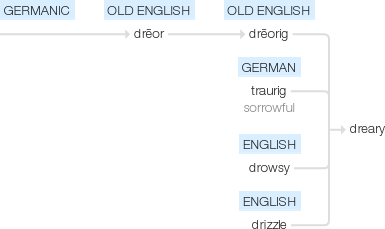Dreary
Old English drēorig ‘gory, cruel’, also ‘melancholy’, from drēor ‘gore’, of Germanic origin; related to German traurig ‘sorrowful’, also to drowsy, and probably to drizzle.
wiktionary
From Middle English drery, from Old English drēoriġ(“sad”), from Proto-Germanic *dreuzagaz(“bloody”), from Proto-Indo-European *dʰrews-(“to break, break off, crumble”), equivalent to drear + -y. Cognate with Dutch treurig(“sad, gloomy”), Low German trurig(“sad”), German traurig(“sad, sorrowful, mournful”), Old Norse dreyrigr(“bloody”). Related to Old English drēor(“blood, falling blood”), Old English drysmian(“to become gloomy”).
etymonline
dreary (adj.)
Old English dreorig "sad, sorrowful," originally "cruel, bloody, blood-stained," from dreor "gore, blood," from (ge)dreosan (past participle droren) "fall, decline, fail," used of rain, snow, dew, fruit, and the slain, from Proto-Germanic *dreuzas (source also of Old Norse dreyrigr "gory, bloody," and more remotely, Old Saxon drorag, Middle High German troric "bloody;" German traurig "sad, sorrowful"), from PIE root *dhreu- "to fall, flow, drip, droop" (see drip (v.)).
The word has lost its original sense and the notion of "dripping blood." Sense of "lonesomely dismal, gloomy" first recorded 1667 in "Paradise Lost," but Old English had a related verb drysmian "become gloomy." Weakened sense of "causing a feeling of tedium, tiresomely monotonous" is by 1871. Related: Drearily.
